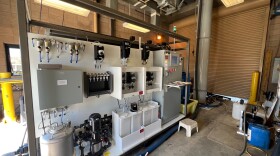-
Those who can’t afford fluoride pills or who don’t seek regular dental care will suffer, according to oral health advocates.
-
While not all Utah cities and municipalities fluoridate their water, the ones that do will no longer be allowed to by law starting May 7.
-
Utah lawmakers who pushed for a ban said putting fluoride in water was too expensive. For public health reasons, fluoride is added to water to strengthen teeth and reduce cavities.
-
The Pacific Institute reports looks at nature-based solutions and technology to help those hit hardest by climate change. But as federal funding dries up, it could be harder to address water woes and prepare communities for more frequent and extreme weather.
-
Some schools, parks and homes in St. George still use drinking water to water lawns. As the fast-growing desert community looks to stretch supplies, it’s connecting more of them to secondary water.
-
Washington County’s Eden Technologies is building a way to get more freshwater from saltwater through desalination. A $250,000 investment from the new Utah Innovation Fund could help.
-
As southwest Utah looks toward a future of continued growth, it’s betting big on reusing the water it already has. That’s why St. George is building a new reservoir to hold more recycled wastewater.
-
Cities throughout the Colorado River basin are looking to stretch out their existing water supplies in the face of climate change and steady demand. Some are turning to direct potable reuse, which treats wastewater until it's clean enough to drink.
-
Though historic snowfall eased drought conditions, threats of extended dry periods don’t let up in the arid West. That’s why water managers are working on creating sustainable water supplies, including turning the water that flushes down people’s toilets into drinking water from their taps.
-
In the Southwest, tribal health organizations are finding ways to counter the factors — including the lack of access to clean drinking water — that contribute to high rates of childhood obesity in Native communities.
-
Nevada lawmakers are considering a significant shift in water use for Las Vegas, one of the driest major metropolitan areas in the U.S.
-
The Biden administration on Thursday said 15 Native American tribes will get a total of $580 million this year to fund settlements that ensure access to water that's legally theirs.
Play Live Radio
Next Up:
0:00
0:00
Available On Air Stations











